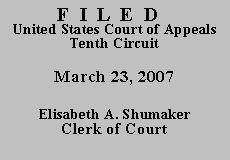

| UNITED STATES OF AMERICA,
Plaintiff-Appellee, v. ARTURO TRELLES-ALCAZAR, Defendant-Appellant. |
|
knowingly, voluntarily and expressly waive[s] [his] right to appeal any sentence imposed on [him], and the manner in which the sentence is determined, on any of the grounds set forth in [18 U.S.C. § 3742] or on any ground whatever, except . . . (1) a sentence above the maximum penalty provided in the statute of conviction as set forth in [the agreement]; and (2) a sentence above the high end of the guideline range as determined by the district court at sentencing, or, in the event that no such determination is made by the district court, a sentence above the high-end of the guideline range as set forth in the final presentence report.
Statement by Def. in Advance of Plea of Guilty, at 3. The district court found the guideline range to be 87-108 months and imposed a sentence of 87 months, far under the statutory maximum of life imprisonment. Mr. Trelles-Alcazar appealed, and the government moved to enforce his appeal waiver under United States v. Hahn, 359 F.3d 1315 (10th Cir. 2004) (en banc). We grant the motion and dismiss the appeal.
Under Hahn, we consider "(1) whether the disputed appeal falls within the scope of the waiver of appellate rights; (2) whether the defendant knowingly and voluntarily waived his appellate rights; and (3) whether enforcing the waiver would result in a miscarriage of justice." Id. at 1325. The miscarriage-of-justice prong requires the defendant to show (a) his sentence relied on an impermissible factor such as race; (b) ineffective assistance of counsel in connection with the negotiation of the appeal waiver rendered the waiver invalid; (c) his sentence exceeded the statutory maximum; or (d) his appeal waiver is otherwise unlawful and the error "seriously affect[s] the fairness, integrity or public reputation of judicial proceedings." Id. at 1327 (quotation omitted). The government's motion addresses these considerations, explaining why they do not undermine the appeal waiver here.
Counsel for Mr. Trelles-Alcazar responded to the motion by (a) stating that the only legitimate issue still available for review would be ineffective assistance of counsel in connection with the appeal waiver, but that it would be a conflict of interest for him to assess his own effectiveness; and (b) asking that alternative counsel be appointed for the purpose of conducting that assessment. Aplt. Resp. to Motion for Enforcement of Plea Agreement, at 2 (filed Dec. 26, 2006). The clerk sent a notice to Mr. Trelles-Alcazar on January 24, 2007, informing him of these circumstances, directing him to file his own response within fourteen days showing why his appeal waiver should not be enforced, and warning that noncompliance could result in dismissal of the appeal. At the end of that period, Mr. Trelles-Acazar filed a motion for enlargement of time to respond and for appointment of different counsel. His motion was granted as to the requested extension, which allowed him an additional fourteen days to respond. This second deadline has long since passed without any further submission.
The materials before us indicate that the only potential issue to be raised concerns ineffective assistance of counsel in connection with the appeal waiver. But this appeal is not the proper vehicle for that challenge. The record before us includes formal representations by Mr. Trelles-Alcazar reflecting only the adequacy of his representation in the proceedings, so any ineffective assistance claim would have to rely on extra-record exchanges between counsel and client beyond our purview. Such a claim must be raised by motion under 28 U.S.C. § 2255 rather than by appeal, United States v. Delacruz-Soto, 414 F.3d 1158, 1168 (10th Cir. 2005), and "[t]his rule applies even where a defendant seeks to invalidate an appellate waiver based on ineffective assistance of counsel," United States v. Porter, 405 F.3d 1136, 1144 (10th Cir.) (citing Hahn, 359 F.3d at 1327 n.13), cert. denied, 126 S. Ct. 550 (2005). We note that Mr. Trelles-Alcazar's plea agreement also waived collateral review, Statement by Def. in Advance of Plea of Guilty, at 4, but, like the appeal waiver, that does not bar an ineffective assistance claim relating to negotiations leading to the waiver itself. Accordingly, we grant the government's motion to dismiss this appeal, though that ruling does not preclude or prejudice an ineffective assistance claim properly pursued through collateral proceedings under § 2255.
The government's motion is GRANTED and this appeal is DISMISSED. Appellant's motion for appointment of counsel is DENIED. The mandate shall issue forthwith.
ENTERED FOR THE COURT
PER CURIAM
*. This panel has determined unanimously that oral argument would not materially assist the determination of this appeal. See Fed. R. App. P. 34(a)(2); 10th Cir. R. 34.1(G). The case is therefore ordered submitted without oral argument. This order and judgment is not binding precedent, except under the doctrines of law of the case, res judicata, and collateral estoppel. It may be cited, however, for its persuasive value consistent with Fed. R. App. P. 32.1 and 10th Cir. R. 32.1.